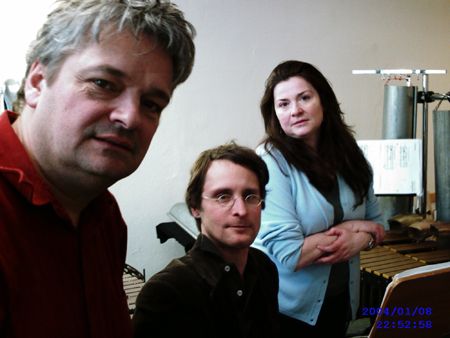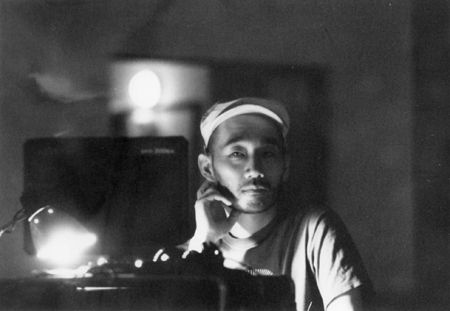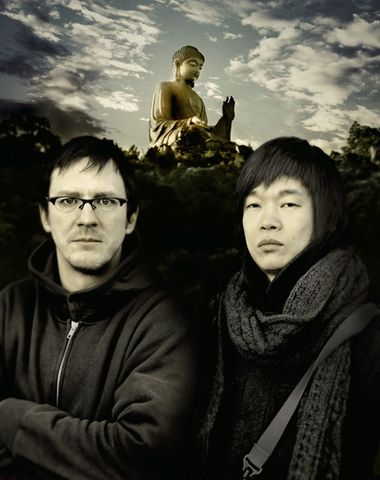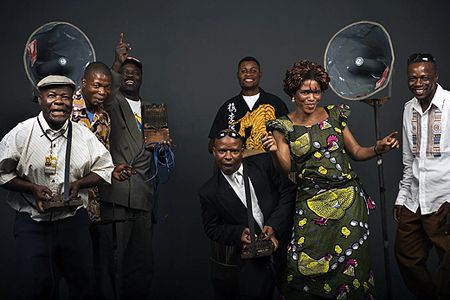concert
The Necks | Morton Feldman: "for Philip Guston" - Trio Nexus | Toshimaru Nakamura | FM3
at the House of World Cultures
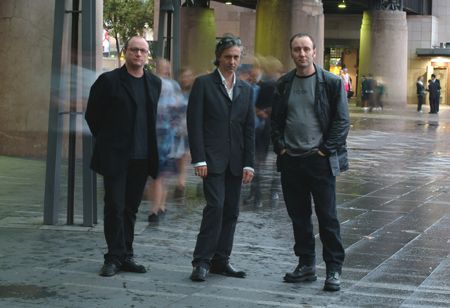
Morton Feldman: “for Philip Guston” - Trio Nexus 15h
Erik Drescher – flute, Tomas Bächli – piano, Claudia Sgarbi – percussion
The American composer Morton Feldman (1926-1987) belonged to the “New York School” along with John Cage, Christian Wolff, and Earle Brown – four composers who stood in constant exchange and yet wrote completely different music. Feldman works almost exclusively with very quiet tones stretched long. Harmony and timbre are used with great precision. The length of the pieces raises the question whether anyone can listen concentratedly to them throughout. But this must not mislead one into the assumption that Feldman’s music is to be seen as background music. It is a contradiction in itself: one cannot avoid drifting away from it occasionally, and yet the moment one comes back to it, one recognizes how worthwhile it is to listen carefully to this nuanced play with musical patterns. It is clearly even legitimate to leave and return again later to the concert hall during the performance. Starting with the ensemble of instruments for which Feldman wrote his late trios – “Why Patterns?”, “Crippled Symmetry”, “for Philip Guston” – Nexus expands the repertoire by commissioning composers to create new works for flute, piano, and percussion. Among the compositions thus created are works by Peter Ablinger, Antoine Beuger, Alvin Lucier, Sven-Ake Johansson, and Juliane Klein.
--- Intermission with Soup ---
Toshimaru Nakamura 20h
After many unhappy years as a guitarist, Nakamura abandoned the instrument he had learned in favor of a no-input mixing board he invented. As the name itself reveals, Nakamura uses the mixing board by itself: He thereby connects its outputs with its inputs to create feedback effects in the mixing board. Overlaid rhythmic structures and tone surfaces form a dense music in which the seamless transition between rhythm and tone is unusually graspable. Toshimaru Nakamura is meanwhile one of the best-known musicians in the Tokyo improvised music scene and has released numerous recordings, including with Fennesz, Otomo Yoshihide, Sachiko M, John Butcher, and Oren Ambarchi.
FM3 20:35h
Twenty years ago, Christiaan Virant went from the USA to China to learn traditional Chinese music there. He remained, met the film composer Zhang Jian, and founded FM3 with him. The duo’s music takes up traditional Chinese music and mixes it with elements of ambient music. On their Buddha Machine, they have recorded nine loops with nine different traditional instruments. This box, only as big as an I-pod and with a built-in loudspeaker, is recording and player in one: the lo-fi quality of the electronics gives the box a fascinating life of its own. FM3, who gained renown as China’s pioneers in electronic music, have now returned to their beginnings in folk and punk in order to produce a new, psychedelic pseudo-folk. They have long worked with elements of simplicity, silence, and repetition to draw their listeners into a state of acoustic and mental stillness. Their appearance at “my time” builds from this base, but expands the sound character to the volume of a concert hall. At the same time, in their development proceeding from sounds based on the computer and electronics, FM3 go further, this time performing solely with guitar, organ, and voice.
The Necks 21:45h
In The Necks’ fan community, the news has probably already made the rounds: the Australian trio (Chris Abrahams – piano, Lloyd Swanton – bass, and Tony Buck – drums) is coming back to Berlin. The Necks develop grooves that constantly grow in intensity. Broad arcs are drawn in which the music change, almost unnoticeably, spreads out, and breathes. The influences of jazz, minimal music, and African music are audible as essences. But the music the trio plays is unique in its form: Australian “desert music” of the highest order.
Attention: Due to unforeseen circumstances, the concert by Konono No. 1 has had to be canceled!.
Konono No. 1 23:20h
The band from the Congo was founded more than 25 years ago by the meanwhile 74-year-old kalimba virtuoso Mingiedi. Bazombo trance music is the basis of Konono’s repertoire. The 12-person ensemble uses a number of kalimbas (thumb pianos) in every key. To prevail over the noise of Kinshasa, the instruments were outfitted with homemade pickups, microphones, and amplifiers. The sound systems’ distortions were not originally desired. But, like the blues musicians in America in the 1950s, the band developed a taste for them and developed a sound that displays astonishing parallels to the aesthetics of electronic club music. In Berlin, too, they will play with the sound system they have brought along. As a live band, Konono No. 1 has an energy level rarely heard. Their debut album “Congotronics” won the BBC World Music Award in 1006.
“my time” was made possible by a donation from the Friends of the House of World Cultures.
